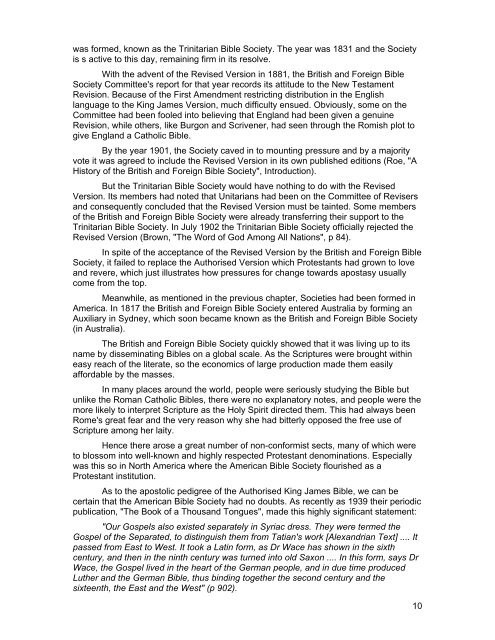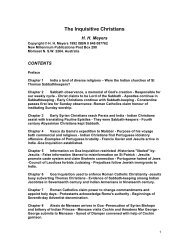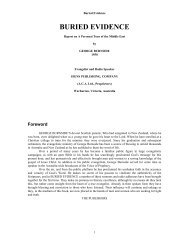Battle of the Bibles - Present Truth
Battle of the Bibles - Present Truth
Battle of the Bibles - Present Truth
Create successful ePaper yourself
Turn your PDF publications into a flip-book with our unique Google optimized e-Paper software.
was formed, known as <strong>the</strong> Trinitarian Bible Society. The year was 1831 and <strong>the</strong> Society<br />
is s active to this day, remaining firm in its resolve.<br />
With <strong>the</strong> advent <strong>of</strong> <strong>the</strong> Revised Version in 1881, <strong>the</strong> British and Foreign Bible<br />
Society Committee's report for that year records its attitude to <strong>the</strong> New Testament<br />
Revision. Because <strong>of</strong> <strong>the</strong> First Amendment restricting distribution in <strong>the</strong> English<br />
language to <strong>the</strong> King James Version, much difficulty ensued. Obviously, some on <strong>the</strong><br />
Committee had been fooled into believing that England had been given a genuine<br />
Revision, while o<strong>the</strong>rs, like Burgon and Scrivener, had seen through <strong>the</strong> Romish plot to<br />
give England a Catholic Bible.<br />
By <strong>the</strong> year 1901, <strong>the</strong> Society caved in to mounting pressure and by a majority<br />
vote it was agreed to include <strong>the</strong> Revised Version in its own published editions (Roe, "A<br />
History <strong>of</strong> <strong>the</strong> British and Foreign Bible Society", Introduction).<br />
But <strong>the</strong> Trinitarian Bible Society would have nothing to do with <strong>the</strong> Revised<br />
Version. Its members had noted that Unitarians had been on <strong>the</strong> Committee <strong>of</strong> Revisers<br />
and consequently concluded that <strong>the</strong> Revised Version must be tainted. Some members<br />
<strong>of</strong> <strong>the</strong> British and Foreign Bible Society were already transferring <strong>the</strong>ir support to <strong>the</strong><br />
Trinitarian Bible Society. In July 1902 <strong>the</strong> Trinitarian Bible Society <strong>of</strong>ficially rejected <strong>the</strong><br />
Revised Version (Brown, "The Word <strong>of</strong> God Among All Nations", p 84).<br />
In spite <strong>of</strong> <strong>the</strong> acceptance <strong>of</strong> <strong>the</strong> Revised Version by <strong>the</strong> British and Foreign Bible<br />
Society, it failed to replace <strong>the</strong> Authorised Version which Protestants had grown to love<br />
and revere, which just illustrates how pressures for change towards apostasy usually<br />
come from <strong>the</strong> top.<br />
Meanwhile, as mentioned in <strong>the</strong> previous chapter, Societies had been formed in<br />
America. In 1817 <strong>the</strong> British and Foreign Bible Society entered Australia by forming an<br />
Auxiliary in Sydney, which soon became known as <strong>the</strong> British and Foreign Bible Society<br />
(in Australia).<br />
The British and Foreign Bible Society quickly showed that it was living up to its<br />
name by disseminating <strong>Bibles</strong> on a global scale. As <strong>the</strong> Scriptures were brought within<br />
easy reach <strong>of</strong> <strong>the</strong> literate, so <strong>the</strong> economics <strong>of</strong> large production made <strong>the</strong>m easily<br />
affordable by <strong>the</strong> masses.<br />
In many places around <strong>the</strong> world, people were seriously studying <strong>the</strong> Bible but<br />
unlike <strong>the</strong> Roman Catholic <strong>Bibles</strong>, <strong>the</strong>re were no explanatory notes, and people were <strong>the</strong><br />
more likely to interpret Scripture as <strong>the</strong> Holy Spirit directed <strong>the</strong>m. This had always been<br />
Rome's great fear and <strong>the</strong> very reason why she had bitterly opposed <strong>the</strong> free use <strong>of</strong><br />
Scripture among her laity.<br />
Hence <strong>the</strong>re arose a great number <strong>of</strong> non-conformist sects, many <strong>of</strong> which were<br />
to blossom into well-known and highly respected Protestant denominations. Especially<br />
was this so in North America where <strong>the</strong> American Bible Society flourished as a<br />
Protestant institution.<br />
As to <strong>the</strong> apostolic pedigree <strong>of</strong> <strong>the</strong> Authorised King James Bible, we can be<br />
certain that <strong>the</strong> American Bible Society had no doubts. As recently as 1939 <strong>the</strong>ir periodic<br />
publication, "The Book <strong>of</strong> a Thousand Tongues", made this highly significant statement:<br />
"Our Gospels also existed separately in Syriac dress. They were termed <strong>the</strong><br />
Gospel <strong>of</strong> <strong>the</strong> Separated, to distinguish <strong>the</strong>m from Tatian's work [Alexandrian Text] .... It<br />
passed from East to West. It took a Latin form, as Dr Wace has shown in <strong>the</strong> sixth<br />
century, and <strong>the</strong>n in <strong>the</strong> ninth century was turned into old Saxon .... In this form, says Dr<br />
Wace, <strong>the</strong> Gospel lived in <strong>the</strong> heart <strong>of</strong> <strong>the</strong> German people, and in due time produced<br />
Lu<strong>the</strong>r and <strong>the</strong> German Bible, thus binding toge<strong>the</strong>r <strong>the</strong> second century and <strong>the</strong><br />
sixteenth, <strong>the</strong> East and <strong>the</strong> West" (p 902).<br />
10





